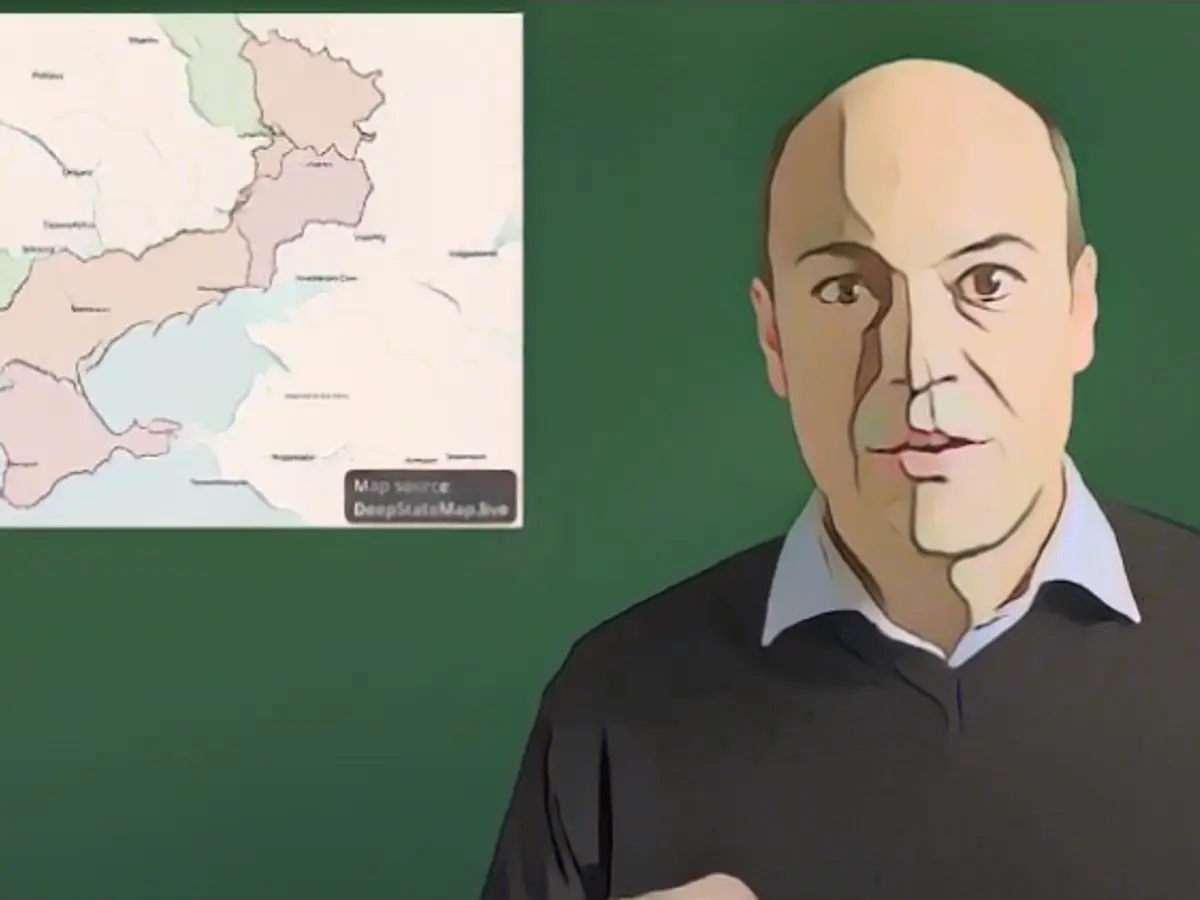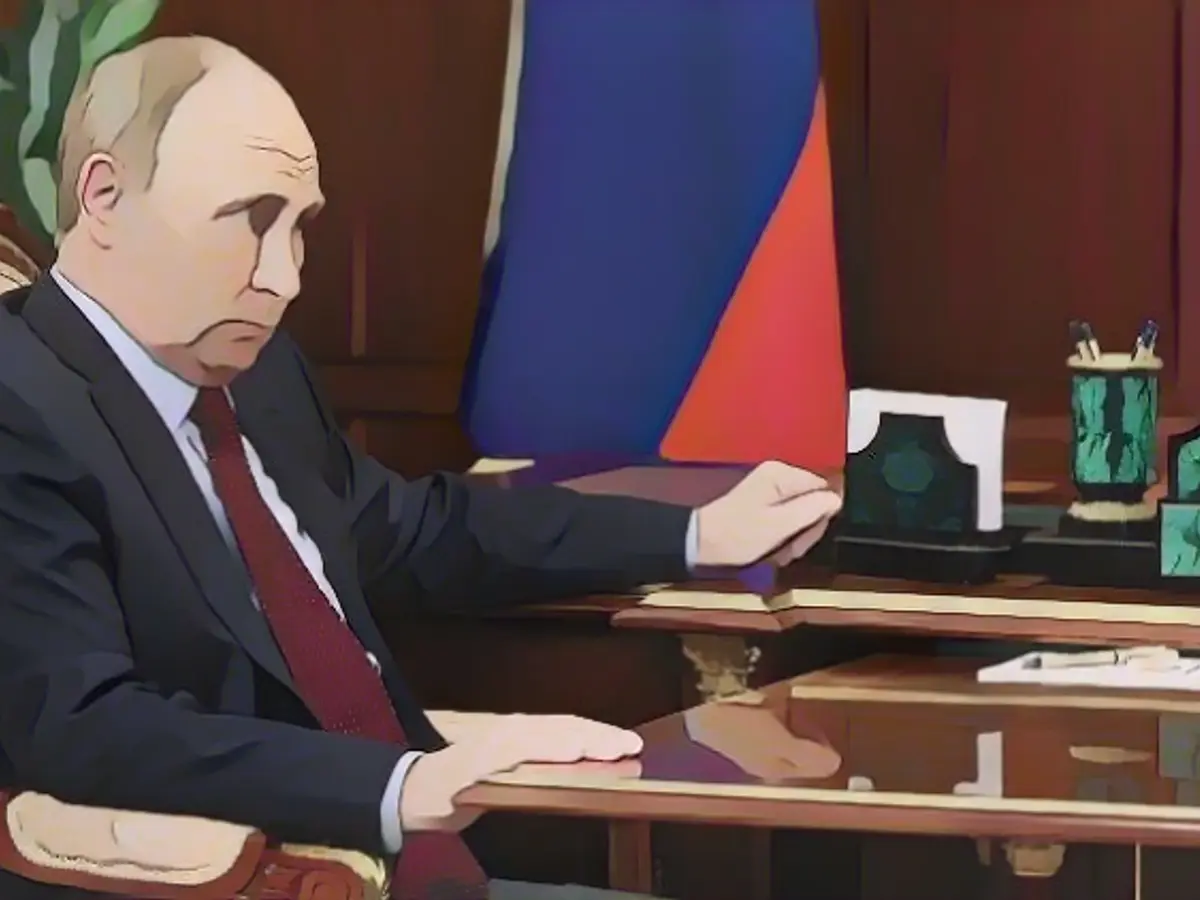"First Putin was in shock, then the West"
Russia's war against Ukraine is at a point "where industrial capacity will determine victory or defeat", says Danish military expert Anders Puck Nielsen in an interview with ntv.de. "If the West decides to support Ukraine, then it seems pretty clear to me that Russia will lose this attrition and production competition in the long term." The problem is that there is currently a lack of political will - even in the USA. Germany is also "still holding back on supplying offensive capabilities that would enable Ukraine to end the war". Nevertheless, Nielsen sees reason for cautious optimism.
ntv.de: You recently pointed out that the war between Hamas and Israel is currently receiving far more attention than the Russian war against Ukraine. Is that still true?
Anders Puck Nielsen: Yes, I think that is definitely the case. The situation in Gaza still gets a lot more attention than Ukraine. I've also noticed it personally: since the beginning of October, I've hardly received any inquiries about Ukraine. Journalists are mainly interested in commenting on the events in Gaza. That is still the case.

Isn't it understandable that the media and the public are more interested in a war that is new?
Yes, that is in the nature of reporting: the media report on what is happening. And at the moment, events in Israel are happening much faster than in Ukraine. Nevertheless, it is important that we do not forget about Ukraine and that the lack of attention does not have the effect of diverting political resources from Ukraine to Israel.
Is it a problem for Ukraine that the Hamas-Israel war is to some extent overshadowing the Russian war of aggression?
The problem arises from the fact that this is happening at a time when we in the West are having a discussion about war-weariness and prospects - in other words, about what strategy the West is pursuing to help Ukraine in the long term. Countries like Hungary, and now Slovakia, are very skeptical about supporting Ukraine. The USA is clearly not in a position to secure funding for aid to Ukraine for the next year. And this discussion is taking place after a Ukrainian summer offensive, which many observers consider to have been a disappointment. The question now is how realistic it is that Ukraine can win the war, which in turn raises the question of whether it is worth investing in this project.
When we spoke in March, you said that it looked like Russia was about to lose the war. The general mood now seems to be much more pessimistic.
I am still cautiously optimistic. If the West decides to support Ukraine, then it seems pretty clear to me that Russia will lose this attrition and production competition in the long run. The combined GDP of Western Europe and North America far exceeds that of Russia. So we wouldn't even have to invest a large part of our GDP in supporting Ukraine and we would still clearly outperform Russia.
Basically, that's where we are now: We are in a phase of the war where industrial capacity will determine victory or defeat. But this requires political will. Especially with regard to the United States, one can worry whether this will is sufficiently present. So I see room for pessimism when a large country like the US is suddenly no longer able to keep its promises.
Oleksiy Melnyk, a Ukrainian military expert, says that the West is still afraid of a Ukrainian victory or a Russian defeat. Is that an accurate description?
Yes, I think so too. Especially at the beginning of the war, there were many political signals that we were standing shoulder to shoulder with Ukraine and the like. But as time goes on, it's becoming increasingly clear that the West, or at least some countries in the West, don't necessarily have the same priorities as Ukraine. Western countries are committed to the continuation of a free and independent Ukraine, but it is not necessarily their priority that the Ukrainian borders of 1991 are restored. Many Western capitals still seem to be looking for a way out for Putin so that a victory over Russia on the battlefield can be avoided. This is mainly about fears of escalation, but it also shows that there is a different understanding of the situation in the West and in Kiev.
In what way?
In Ukraine, the focus is much more on an actual victory. I have heard Ukrainians say several times: I want this fight to end so that my children don't have to fight the same war. This means that if this war is not finally decided and Russia does not lose sufficiently, then there will be another war in a few years' time. The Ukrainians want this to end now, once and for all.
Who specifically are you thinking of when you describe politicians in Western capitals as being too hesitant?
There are some states that are more committed than others, such as the Baltic countries, the UK or my country, Denmark. Countries like Germany are more hesitant. Germany mainly supplies air defense weapons and to Ukraine - things that ensure that Ukraine continues to exist. But Germany is still reluctant to supply offensive capabilities that would enable Ukraine to end the war. I still don't know why Germany is not providing Taurus missiles. But you can also point to the USA. It's becoming increasingly clear that the Biden administration is also not necessarily eager to provide Ukraine with the things that would enable it to go on a major offensive. As a rule, too little comes too late.
One could argue that the West may have an interest in supporting Ukraine, but that our interests are not identical to those of Ukraine.
I would argue two points against this. Firstly, it is a humanitarian problem if you give Ukraine just enough to continue the war, but not enough to end it. Because that also increases the number of civilian casualties. And secondly, we must understand that Russia poses a long-term threat not only to Ukraine, but to the entire Western alliance. From Russia's point of view, it is not just about a small piece of land in eastern Ukraine, but much more.
Is this not understood in the West?
I don't think to a sufficient degree. There is a tendency to misunderstand what the Russians are fighting for in this war. As long as there is this misunderstanding, we will make assumptions about Russia's goals that are simply not true. If we don't recognize that Russia is going to be a problem for the West in the long run, then we're not prepared for what may come next. Russia's aim is to test the cohesion of NATO, to weaken the Western alliance to the point where we no longer know whether the US would help us if it were necessary. If we find ourselves in such a situation, Russia will be the dominant player in Europe. The best way to deal with this challenge would be to make sure that the Russians are not successful in Ukraine. Otherwise they could develop an appetite for more.
One more question about the course of the war: How do you assess the situation on the Dnipro near Kherson, where Ukraine was able to establish the first bridgeheads on the southern side of the riverbank?
That has to be seen in a wider context. At the beginning of the invasion, the Russian side envisioned a blitzkrieg with a quick victory after a few days. When that didn't happen, the political leadership in Russia was obviously in a kind of shock. There were these pictures of Putin trembling and speculation that he was ill. In fact, it was probably more of a nervous breakdown because he had to come to terms with the fact that the quick war wasn't working. The Russians realized that this war would take a while and that they would have to prepare to fight it for many years. Since then, the Russian economy has undergone many changes that are necessary for a long war. A large part of Russia's GDP now goes to the defense sector, and the production of military goods has increased significantly.
Ironically, there has been a similar shift in the West, but also in Ukraine itself. The summer offensive was expected to be a major breakthrough, almost a decision, an end to the war. What we are now experiencing in the West seems to me to be a bit like the time when Putin was in shock and didn't know what to do. And we too must now realize that this is a long road. It's a long, hard war.
And Kherson?
What we are seeing in the Kherson region is very interesting because it sort of draws the contours of what Ukraine can do to change the dynamics of the war in the long term. The bridgeheads on the other side of the Dnipro can open up a new front. The strange thing about the current front line is that it is very long, but at the same time quite compact. The front actually stretches for around 1000 kilometers. But the Dnipro forms the frontline for almost half of it, and there is no major fighting there. If Ukraine manages to establish itself in the Kherson region on the southern side of the river, it would more or less double the front line. That may make 2024 very different from 2023 - or it may be something that affects 2025. Other Ukrainian initiatives that may change the dynamics of the war are their attacks in depth, targeting Russian logistics. That's why it's so frustrating that a country like Germany is not supplying the missiles Ukraine needs for this.
Hubertus Volmer spoke with Anders Puck Nielsen
- In response to Russia's war against Ukraine, Danish military expert Anders Puck Nielsen stresses that industrial capacity could determine the outcome, suggesting that if the West provides sufficient support, Russia may ultimately lose.
- Nielsen expresses concern that despite Russia's attack on Ukraine, the war is receiving less attention than the conflict between Hamas and Israel, potentially leading to a lack of resources for Ukraine.
- Vladimir Putin's reaction to the ongoing war in Ukraine has been a topic of discussion, with Putin reportedly going from a state of shock to a focus on long-term war preparation.
- The Biden administration is being criticized for not providing Ukraine with crucial war supplies, indicated in the article as Taurus missiles, which some believe could help Ukraine achieve a decisive victory in the war against Russia.
Source: www.ntv.de








